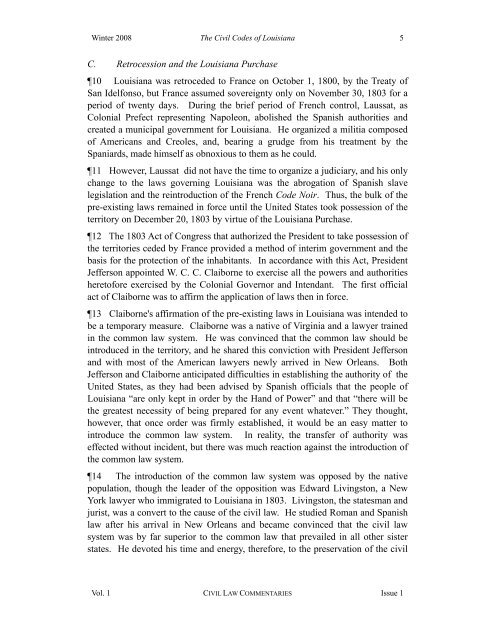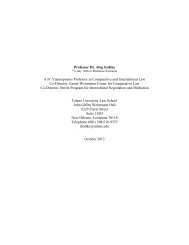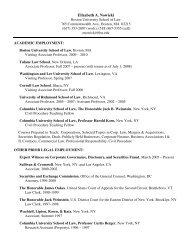Civil Codes of Louisiana - Tulane Law School - Tulane University
Civil Codes of Louisiana - Tulane Law School - Tulane University
Civil Codes of Louisiana - Tulane Law School - Tulane University
Create successful ePaper yourself
Turn your PDF publications into a flip-book with our unique Google optimized e-Paper software.
Winter 2008 The <strong>Civil</strong> <strong>Codes</strong> <strong>of</strong> <strong>Louisiana</strong> 5<br />
C. Retrocession and the <strong>Louisiana</strong> Purchase<br />
10 <strong>Louisiana</strong> was retroceded to France on October 1, 1800, by the Treaty <strong>of</strong><br />
San Idelfonso, but France assumed sovereignty only on November 30, 1803 for a<br />
period <strong>of</strong> twenty days. During the brief period <strong>of</strong> French control, Laussat, as<br />
Colonial Prefect representing Napoleon, abolished the Spanish authorities and<br />
created a municipal government for <strong>Louisiana</strong>. He organized a militia composed<br />
<strong>of</strong> Americans and Creoles, and, bearing a grudge from his treatment by the<br />
Spaniards, made himself as obnoxious to them as he could.<br />
11 However, Laussat did not have the time to organize a judiciary, and his only<br />
change to the laws governing <strong>Louisiana</strong> was the abrogation <strong>of</strong> Spanish slave<br />
legislation and the reintroduction <strong>of</strong> the French Code Noir. Thus, the bulk <strong>of</strong> the<br />
pre-existing laws remained in force until the United States took possession <strong>of</strong> the<br />
territory on December 20, 1803 by virtue <strong>of</strong> the <strong>Louisiana</strong> Purchase.<br />
12 The 1803 Act <strong>of</strong> Congress that authorized the President to take possession <strong>of</strong><br />
the territories ceded by France provided a method <strong>of</strong> interim government and the<br />
basis for the protection <strong>of</strong> the inhabitants. In accordance with this Act, President<br />
Jefferson appointed W. C. C. Claiborne to exercise all the powers and authorities<br />
heret<strong>of</strong>ore exercised by the Colonial Governor and Intendant. The first <strong>of</strong>ficial<br />
act <strong>of</strong> Claiborne was to affirm the application <strong>of</strong> laws then in force.<br />
13 Claiborne's affirmation <strong>of</strong> the pre-existing laws in <strong>Louisiana</strong> was intended to<br />
be a temporary measure. Claiborne was a native <strong>of</strong> Virginia and a lawyer trained<br />
in the common law system. He was convinced that the common law should be<br />
introduced in the territory, and he shared this conviction with President Jefferson<br />
and with most <strong>of</strong> the American lawyers newly arrived in New Orleans. Both<br />
Jefferson and Claiborne anticipated difficulties in establishing the authority <strong>of</strong> the<br />
United States, as they had been advised by Spanish <strong>of</strong>ficials that the people <strong>of</strong><br />
<strong>Louisiana</strong> “are only kept in order by the Hand <strong>of</strong> Power” and that “there will be<br />
the greatest necessity <strong>of</strong> being prepared for any event whatever.” They thought,<br />
however, that once order was firmly established, it would be an easy matter to<br />
introduce the common law system. In reality, the transfer <strong>of</strong> authority was<br />
effected without incident, but there was much reaction against the introduction <strong>of</strong><br />
the common law system.<br />
14 The introduction <strong>of</strong> the common law system was opposed by the native<br />
population, though the leader <strong>of</strong> the opposition was Edward Livingston, a New<br />
York lawyer who immigrated to <strong>Louisiana</strong> in 1803. Livingston, the statesman and<br />
jurist, was a convert to the cause <strong>of</strong> the civil law. He studied Roman and Spanish<br />
law after his arrival in New Orleans and became convinced that the civil law<br />
system was by far superior to the common law that prevailed in all other sister<br />
states. He devoted his time and energy, therefore, to the preservation <strong>of</strong> the civil<br />
Vol. 1 CIVIL LAW COMMENTARIES Issue 1





